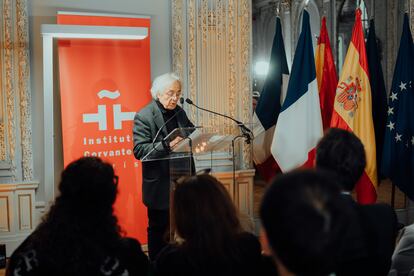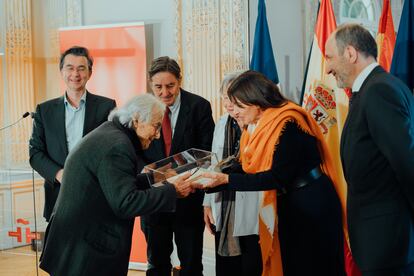Syrian poet Ali Ahmad Said Esber (Qasabin, 94 years old), known by his pseudonym Adonis, firmly believes in the power of poetry. Unlike politics, he maintains, it remains and induces constant questions. “Any society must be based on freedoms and above all on the freedom of speech,” emphasizes the author, considered one of the pioneers of modern Arabic poetry. This is what he hopes for Syria, where he fled at the age of 26 after spending a year in prison. He developed his literary career in Lebanon, but during the civil war, he also left that country in 1986. Since then he has lived in Paris, where the mayor, Anne Hidalgo, presented him with the Joan Margarit International Poetry Prize this Wednesday.
“Poetry does not transform events nor does it change situations, but it creates a new consciousness, which allows the individual to see the world in a new, different way, and allows him to conceive other possibilities,” declared Adonis upon receiving the award at the Institute. Cervantes of the French capital. The jury, made up of the director of the Cervantes Institute, Luis García Montero; the editor and writer Javier Santiso; the Colombian writer Héctor Abad Faciolince; the former director of the National Library, Ana Santos; and Mònica Margarit, daughter of the poet Joan Margarit, decided to award him the prize “for a lyrical work of indisputable quality and for its cultural dialogue between civilizations, between East and West.” His writings, among which stand out Songs of Mihyar of Damascus (1961), Epitaph for New York (1971) or the three volumes of The Bookhave been translated into numerous languages. This is the second edition of the award, which American poet Sharon Olds received last year.
Adonis’ work reflects his commitment to human rights. The writer, whose name has been nominated for the Nobel Prize in Literature for years, has repeated on multiple occasions that he rejects any ideology. That is partly why he observes what is currently happening in Syria, where an alliance of rebel groups led by the Islamists of Hayat Tahrir al Sham (HTS) overthrew President Bashar al-Assad on Sunday, after more than two decades in power. The offensive of the rebel coalition began on November 27 in northwest Syria and concluded with the capture of Damascus, from where the president fled. And, although the end of the regime provoked a wave of hope within the population, it also opens a period of uncertainty after 14 years of war.
Adonis insists that he is not a politician and remembers that he left Syria in 1956. But he agrees to answer some questions about the situation in the country where he was born. “I don’t regret at all what ended, that is, the regime that was there. I was always against it. But I don’t know what is going to replace it, what are they going to do?” he asks. “The issue is not to change the regime. It is changing society,” says the poet. After the Arab Spring, the wave of protests that shook Tunisia, Egypt, Yemen and Syria starting in 2011, the author received an avalanche of criticism for maintaining that they had not been revolutions. The revolts, he argued at the time, only overthrew the leaders, but without changing the structures of power or society itself.
Today he wonders what will happen in Syria. Will it be a society founded on rights and freedoms? Will religion be separated from politics? “Any society must be based on freedoms and above all on the freedom of speech,” he insists. “Let’s hope something along those lines happens in Syria. If not, we just go around. We advance theoretically, but we take steps backwards in practice,” he analyzed before the delivery ceremony.

Luis García Montero participated in the event; Victorio Redondo, ambassador of Spain in France; and Javier Santiso, founder of the publishing house La Cama Sol, which will publish the speech that the Syrian poet gave when receiving the award, and will disseminate it both in Spain and abroad, with translations into Spanish, English and French. The award was presented by Anne Hidalgo, the mayor of Paris, who highlighted the role of the arts in society. “We cannot do without poetry,” he said. Culture, he added, “is like the air we breathe. We need it like we need air to breathe and to live.” The recognition is promoted by the Cervantes Institute, La Cama Sol and Margarit’s family (1938-2021) with the aim of publicizing the work of the Catalan author, who had the Cervantes Prize and the Reina Sofía Prize for Poetry.
Adonis introduced prose poetry and free verse into Arabic literature. He insists that what remains, after all and more than politics, is poetry. And he cites the example of Vladimir Mayakovsky, a leading figure in Russian poetry at the beginning of the 20th century. “If we make a comparison between Lenin, who founded the Soviet State, and Mayakovsky, which of the two evokes us more today? It’s Mayakovsky. Because Lenin was linked to the State, to history, to ideology. But Mayakovsky changed the relationship between words and things. “This change will last forever,” he details. “What remains is poetry, not politics,” he adds.

